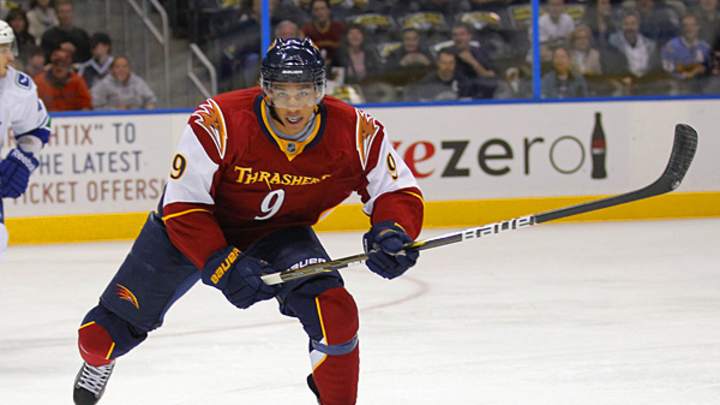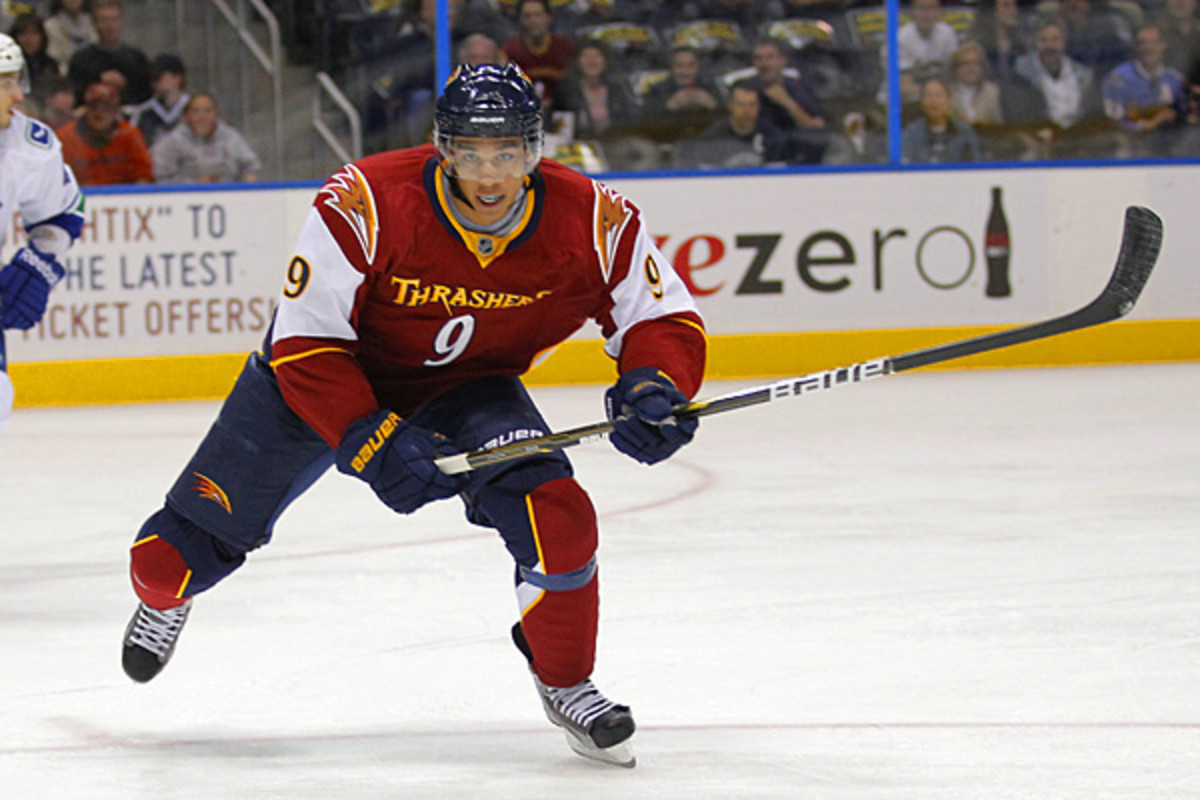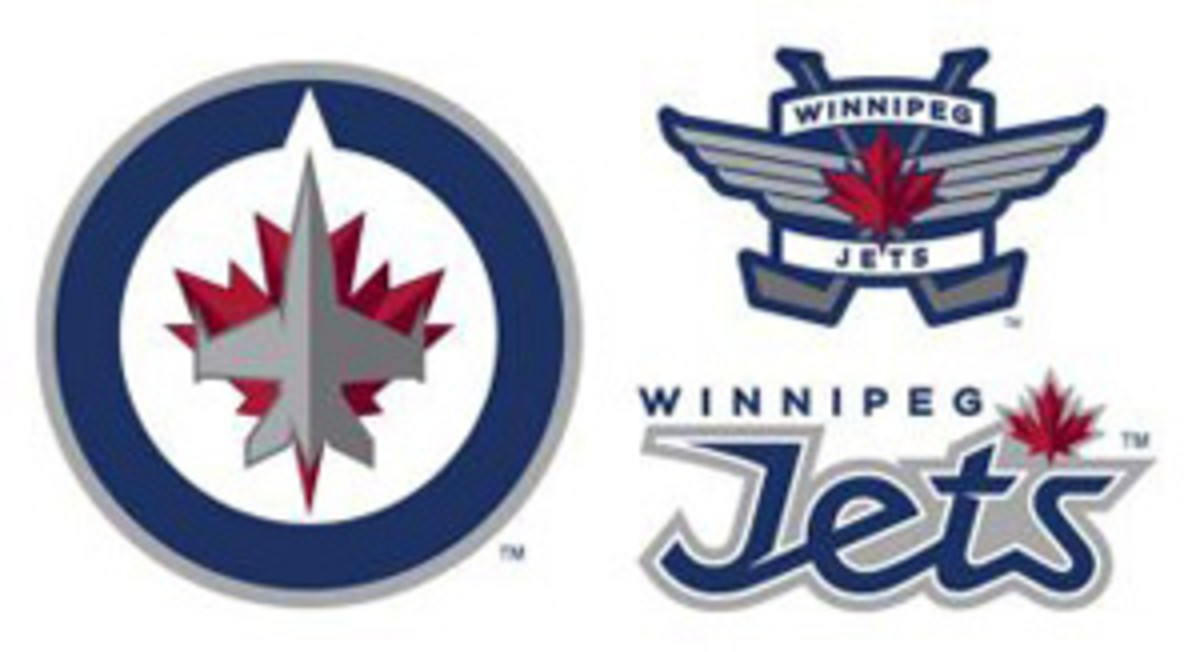Where does the Jets' history reside?

Thanks to the Phoenix Coyotes, the most famous No. 9 in the new Winnipeg Jets history is not Hockey Hall of Famer Bobby Hull, it's Marc Savard or young Evander Kane (pictured). (Todd Kirkland/Icon SMI)

By Stu Hackel
The Winnipeg Jets are not the Winnipeg Jets. And if that sounds confusing, be prepared for more of the same, because the team that will start play this fall in Winnipeg can't claim the history of the team with the same name that once played there. It is what it is, except when it's not.
The Jets unveiled their new crest and logo Friday.

This all started when Evander Kane, the emerging star of the team formerly known as the Atlanta Thrashers, said he would like to continue wearing the number 9 on his sweater. But Kane recognizes that the man who wore 9 for the Winnipeg Jets was Bobby Hull, one of the greatest and most popular pro hockey players ever. It was for Hull that 9 was retired by the Jets. So, respectful and knowledgeable guy that Kane is, he told Steve Ewen of The Vancouver Province earlier this week that he planned on asking Hull if it would be alright for him to keep his old number on the new Jets sweater. He'd take 19 if he couldn't, but he'd really like to wear 9.
Then word got out that, technically, Kane didn't have to ask Hull anything because the Jets' history -- its franchise records, its retired numbers -- all traveled south when the team was sold and moved to Arizona in 1996. It is there that Hull's 9 -- as well as Dale Hawerchuk's 10 and Thomas Steen's 25 -- were officially retired. (The Coyotes briefly unretired 9 so that Brett Hull could wear his father's number for his last five NHL games.) And, moreover, it's in Phoenix where Teemu Selanne's record of 76 goals in a season, scored as a Winnipeg Jets rookie, remains the franchise mark.
The NHL has decreed that the history of the new Winnipeg Jets is actually that of the team that flew north from Atlanta. Its record for most goals in a season belongs to Ilya Kovalchuk, who merely scored 52. Their number 9 is Evander Kane.
No one who has paid attention to the way pro sports generally works can be surprised by this. The lawyers who run things make these rulings and when an NHL franchise -- which is, after all, primarily a business entity as far as they are concerned -- moves from one locale to another, its history tags along with it.
(There is no small amount of irony here in the NHL ruling on Hull's number. Most of what Hull did to get his number retired in Winnipeg occurred over the eight years the Jets played not in the NHL but in the hated WHA, where he won two AVCO Cup titles and scored a then-pro hockey record of 77 goals in a season, none of which the NHL recognized. Hull played only 18 games for the Jets in the NHL. In fact, Hull's thumbing his nose at the NHL when he jumped to the rebel league in 1972, giving it instant credibility, is a huge part of why he's celebrated in Winnipeg. The NHL condemned Hull when he jumped leagues, and it is now deciding the fate of his number for a team in a despised enemy league. It's a bit bizarre. But we digress.)
Fans don't think like lawyers, however, which carries pluses and minuses. There are some serious emotions involved in being a sports fan that the law cares little about. That's one reason the lady who holds the scales of justice is blindfolded. But as far as Winnipeggers are concerned, they cheered for the Jets back in the day and they're going to be cheering for the Jets once again. That's their team and when it became clear that the Jets' retired numbers were in the Coyotes' domain and that the most the new Jets could do was pay tribute to them with banners in the MTS Centre rafters and play on, some in the 'Peg were displeased.
"Is that good enough?" asks Ted Wyman The Winnipeg Sun today. "The purist in me says no. Simply by taking the Jets name, the organization is assuming its history, Phoenix Coyotes be damned. There are some who will see players wearing the numbers of Hull, Hawerchuk and Steen as a dishonour to the past.
"Then again, would it make sense for the numbers to be retired by two franchises? Probably not. Would the NHL even allow it? We asked the question but received no response."
Well, Ted, I think you got your response right there.
Since lawyers are all about precedent, it's instructive to look at some similar situations in pro sports' past. Baseball's Washington Senators left for Minnesota to become the Twins in 1961. An expansion Senators took their place for the next season. Yes, the Twins took all the Senators' history with them. On the Twins website, if you rummage through the section on the team's all-time leaders, you'll find that all their career pitching marks belong to the Senators' Walter Johnson from the early 20th century. The new Senators started fresh, and when they moved to Texas to become the Rangers for the 1972 season, they brought the second Senators' fairly miserable history with them.
Here's another interesting case that's probably most telling: The NFL's Browns upped and moved to Baltimore to become the Ravens for the 1996 season and Cleveland was left without a team for three years until the league put an expansion club named the Browns back in town. But this new club claims the old Browns' history. Its page at NFL.com even recognizes that the Browns were founded in 1946. It's a situation that aggrieved Jets fans might embrace to reclaim their legacy.
But-- and it's a big but -- after owner Art Modell announced that he was moving the team, the fans went understandably ballistic, and along with the City of Cleveland mounted a grassroots campaign to stop them. The city sued the team to keep it in place for the remaining three years of its lease at decrepit Municipal Stadium. Before the lawsuit went to trial, the NFL negotiated a settlement that allowed Modell to move with all his players and personnel, but promised Cleveland a new or relocated team within three years along with the right to the club's history, name and colors in exchange for dropping their legal action. The Browns were officially "deactivated" and when they returned in 1999, the fans had their club again, history included.
Whatever disgruntlement ensued when the Jets moved to Phoenix didn't result in anything like that. But the absence of legalities won't deter some from wanting their history back. Ed Tait in The Winnipeg Free Press thinks it's "goofy" that the Coyotes get to claim what Winnipeggers witnessed and cheered for as their own.
"Most goals by a rookie? A measly 29 -- measly by Selanne standards (76) -- set by Ilya Kovalchuk in 2001-02," Tait snorts. "The franchise's first captain isn't the legendary Lars-Erik Sjoberg, but Kelly Buchberger. The point total for the all-time leading scorer isn't Hawerchuk's 929, but Kovalchuk's 615. Takes some getting used to, doesn't it hockey fans? (Just imagine the confusion if the Coyotes pull up and leave...the Jets' records could conceivably end up in Quebec City with the Nordiques' history now in Colorado.)"
"It does seem a little weird, all of this," Thomas Steen told Tait. "We played all our hockey here, after all."
Weird or not, that's how it is going to be. They won't like it in Winnipeg, but they'll survive. And while some may feel the urge to say, "Hey, you just got a team back and you're whining already?" Jets fans do have a point -- and they've got a long tradition of being less-than-cozy toward the hockey establishment. The maelstrom that accompanied the birth of the WHA, the antagonism it engendered toward the NHL, is part of the hockey DNA in Winnipeg. It was reinforced by the original Jets' departure and years of watching teams added to the league elsewhere. Their raw feelings are probably not going to subside quickly.
